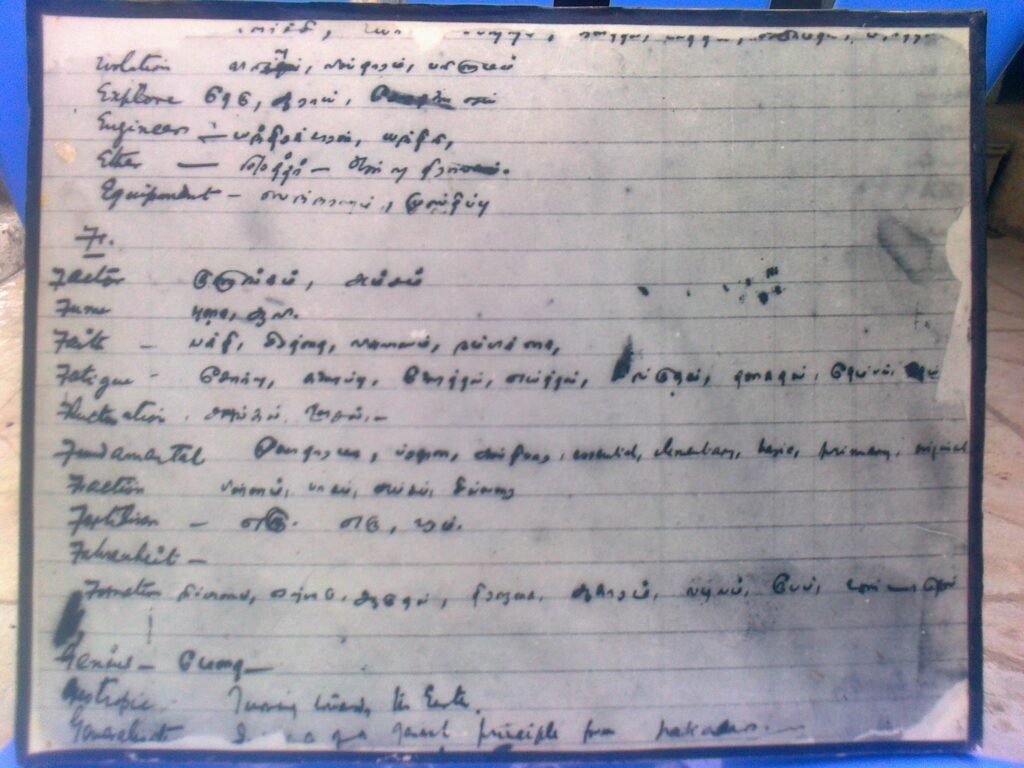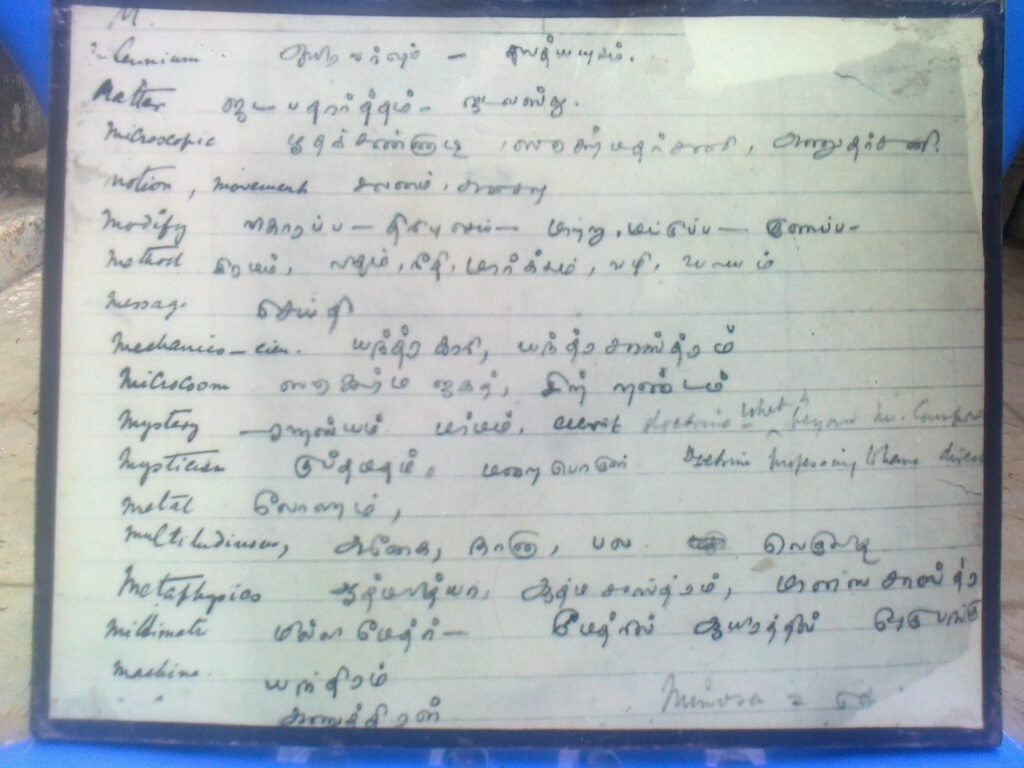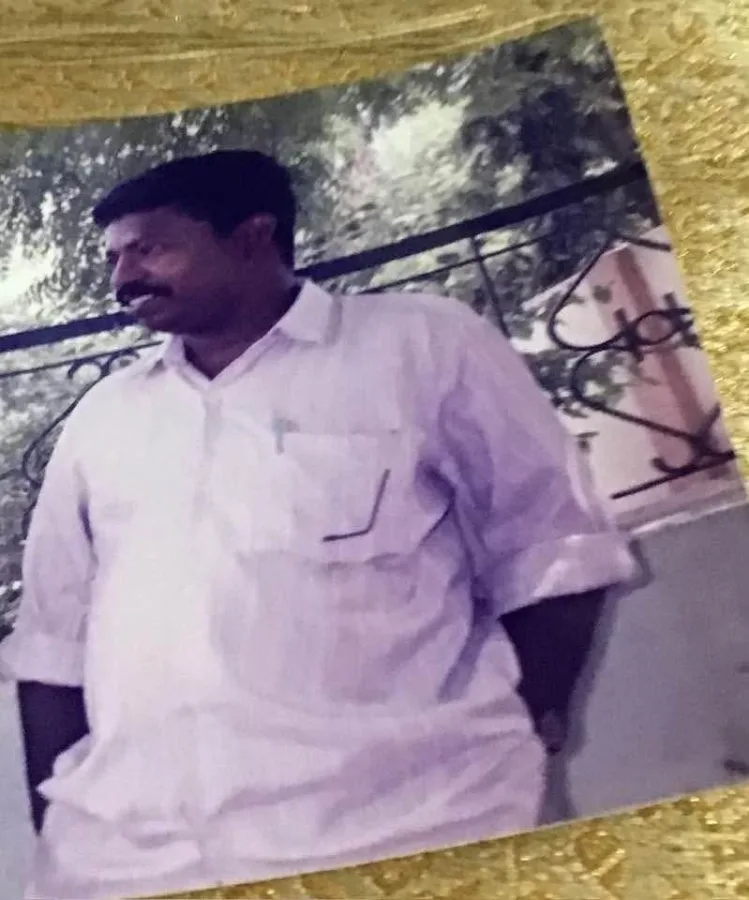Read in : தமிழ்
Subramaniya Bharathi is credited with ushering in the modern era in Tamil poetry. As a pioneer in English to Tamil translation, he also created many Tamil usages that are in common parlance today. Bharathi’s handwritten notes in which he is suggesting Tamil equivalents to common English words used in journalism stand testimony to this facet of the poet. The notes written some 100 years ago have been preserved as laminated sheets at the Bharathi memorial library in Puducherry. Journalist Ellusamy Karthik has helped to publicize this relatively lesser known treasure.
Tamil journalists often need to translate English news articles. Today this work is far easier with tools on hand and communication being easy. But some 100 years ago, though the job was same it was challenging.
Since news was transmitted through English telegrams, English newspapers did not have to translate the news. But Tamil journalists had to do so. And they had to do it under deadline pressure – when there was no google. Morning news had to go into evening newspapers. TS Chockalingam, the first editor of Tamil newspaper Dinamani, has written about those challenges in an essay on Tamil journalism.
Subramania Bharathi must have faced these challenges. He was serving as assistant editor at Swadesamitran and editor in publications like India and Chakravarthani. He has remarked that Tamil prose was fairly recent. One hundred years after his death, we recognize that Bharathi was aware of standards were being set for future. He therefore advocated using simple words that conveyed the meaning with clarity.
Recognizing himself as a pioneer in translation, he said simple words that conveyed the meaning with clarity had to be used in translation.
Bharathi lamented in India newspaper (edition dated September 24, 1909) that Tamil newspaper journalists had the habit of retaining English words they found untranslatable. And even the explanations they gave in Tamil for such words had errors and written in English style.
Bharathi didn’t shy away from coining new words in keeping with his beliefs considered avant-garde for his time. For instance, he coined the word male-widow in Tamil to describe a man who had lost his wife. There was no word in Tamil for that. He did that when he wrote critiquing Gandhi’s views on widows. Gandhi didn’t advocate widow remarriage, but tried to be evenhanded by saying men who lost their wives shouldn’t remarry either. Bharathi said Gandhi was being asked what should be done with growing number of widows in society. Instead of addressing the problem, Gandhi wanted the number of “male-widows” (Tamil equivalent) to grow, Bharathi said.
Bharathi also criticized the tendency to ascribe gender to newspaper names. Desabhaktan had become masculine and Navasakthi had become feminine in some writings. Bharathi said he preferred neutral gender for newspaper names. He also advocated using Tamil equivalents for chemical substances as much as possible. He said Tamil equivalents for oxygen and hydrogen should be used. He took a similar stand on diseases. Bharathi said if Tamil words couldn’t be found, then Sanskrit words should be used preferably, but not English.
While translating an article on women’s liberation in South Africa, Bharathi was unable to translate the word member. He considered various Tamil words but didn’t think they were appropriate. Finally, he used the word member and wrote it in Tamil. Later, he wrote about his struggle and said he felt disappointed. He asked that experts and scholars should find a suitable Tamil word for member.
Bharathi has talked about how his translation work helped him. He said English was a graceful language and while translating it he wanted to retain its grace in Tamil. For that, he had to formulate many Tamil words. The effort proved to him that Tamil was sublime and had much flavour. Bharathi’s biographer Va Ra has written about this.
Pa Irairasan who did his PhD thesis on Bharathi’s journalism has written that Bharathi did use many English words in Tamil, too. While writing in the newspaper, Swadesamitran, he retained the word coral while using it to describe a coral mill although he used the Tamil word for factory for mill. Similarly, Bharathi retained the English words contractor, conference, and government although he sometimes used his Tamil coinage for government. Bharathi, however, found a Tamil equivalent for the term, “reception committee”, as well as for excursion.
Below are the Tamil equivalents Bharathi used in the year 1906 for various English words, as per Iraiarasan.
Methods: முறைமைகள்
Moderates: நடுத்தரர் கட்சி, நிதானக் கட்சி
Reporters: பத்திரிகை பிரதிநிதிகள் (ரிப்போர்ட்டர்கள்)
Hero worship: வீர பூஜை
Arts college: சித்திரகலாசாலை
Proclamation: உறுதிப்பாடு
Death rate: மரணத் திட்டம் (விகிதம்)
Coronation: கிரீடச் சூட்டு
Free Trade: ப்ரீ டிரேட் (வர்த்தக நிர்பந்தமின்மை)
Bank: பாங்கி, பேங்கி
Exhibition: காட்சி, பொருட்காட்சி
Fine Arts: மதுரக்கலை
Boycott: விலக்கம்
Steamer: புகைக்கப்பல்
Collections: பணச்சேகரிப்பு
Tour: யாத்திரை
Native college: சுதேசிய கலாசாலை
East Indian Railways: ஈஸ்ட் இந்தியா இருப்புப்பாதை
Strike: வேலைநிறுத்தம், தொழில் நிறுத்தம்
Primary Education: பிரைமரி கல்வி
English Journals: ஆங்கிலேய (ஆங்கில மொழி) பத்திரிகைகள்
Dissolution: கலைவு
Social Reforms Conference: ஆசாரத் திருத்தச் சங்கம்
Reformers: திருத்தக்காரர்கள்
Revolution: புரட்சி
National Day: தேசத்திருநாள்
Below is the scan of the handwritten notes preserved at the Puducherry Bharathi memorial library.

Bharathi’s handwritten notes on Tamil equivalents

E
Evolution : விரிவு, விஸ்தாரம், பரிணாமம்
Explore: தேடு, ஆராய்
Engineer: யந்திரக்காரன், யந்திரி
Equipment: ஸந்நாணம், முஸ்திப்பு
Ether: ஈத்தர் என்ற திராவகம்
F
Factor : குணாங்கம், அம்சம்
Fume : புகை, ஆவி
Faith: பக்தி, சிரத்தை, விசுவாஸம், நம்பிக்கை
Fatigue : சோர்வு, களைப்பு, இளைப்பு, எய்த்தல், தகைதல்
Fluctation:அலுங்கல், ஊசல்
Fundamental: மூலாதாரமான, ப்ரதான, அஸ்திவார
Fraction : பின்னம், பாவம், அம்சம், சில்லறை
Fertilizer: எரு, உரம்
Formation: ஏற்பாடு, ஆகுதல், திறளுகை, ஆகாரம், வடிவம், ரூபம், உண்டாகுதல்
G
Genius: மேதை
M
Millennium : ஆயிரம் வருஷம், தலத்ய யுகம்
Matter: ஜடபதார்த்தம், ஜடவாஸ்து
Microscope: பூதக்கண்ணாடி, ஸூகத்மதர்சனி, அணுதர்ஷனி
Motion, Movements: சலனம், அசைவு
Method: கிரமம், விதம், நீதி, மார்க்கம், வழி, உபாயம்
Message: செய்தி
Mechanics: யந்த்ர சாஸ்திரம்
Metaphysics: ஆத்ம வித்யா, ஆத்ம சாஸ்திரம், மாலை சாஸ்திரம்
Metal : லோஹம்
Mystery: ரஹஸ்யம், மர்மம்
Mysticism: குப்த மதம், மறைபொருள்
Multidimension: அனேக, நானா, பல, வெகுவித
Microcosm: ஸூகர்ம ஜகத், சிற்றண்டம்
Modify : விகாரப்ப(டுத்து)-, திரிபு செய், மாற்று, மட்டுப்(படுத்து), குணப்(படுத்து)
Millimeter : மில்லி மேத்ர், மேத்ரில் ஆயிரத்தில் ஒரு பங்கு
Machine: யந்திரம்
Read in : தமிழ்











